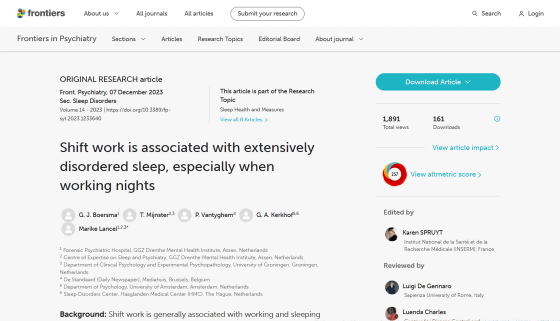Research shows that more than half of workers who work night shifts have sleep disorders, and the negative effects of shift work are most pronounced among young people with low levels of education.

In modern society, there are many jobs that require late-night work, such as in medical institutions, infrastructure-related jobs, and 24-hour convenience stores. A 2015 survey found that approximately 21% of workers living in the EU were engaged in shift work, including night shifts, and in Japan, as of 2012
Frontiers | Shift work is associated with primarily disordered sleep, especially when working nights
https://www.frontiersin.org/articles/10.3389/fpsyt.2023.1233640/full

Working night shifts causes sleep disorders in more than half of workers
https://www.frontiersin.org/news/2023/12/07/night-shifts-sleep-disorders-half-of-workers
More than half of night shift workers have a sleep disorder • Earth.com
https://www.earth.com/news/more-than-half-of-night-shift-workers-have-a-sleep-disorder/
Most Night Shift Workers Have a Sleep Disorder, Study Confirms : ScienceAlert
https://www.sciencealert.com/most-night-shift-workers-have-a-sleep-disorder-study-confirms
Adequate sleep is essential for maintaining a healthy mind and body, but if you work a job that requires night shifts or shift work, your sleep pattern may be disrupted, resulting in sleep deprivation or sleep disorders. The possibility increases.
Professor Marika Lansel , a sleep scientist at the University of Groningen in the Netherlands, said: 'There is a lot of evidence that shift work reduces sleep quality. However, the impact of shift type on the prevalence of various sleep disorders remains unclear. 'Little is known about the differences that occur depending on demographic characteristics and demographic characteristics.'
Ransell's research team recruited 37,662 working adults through newspaper advertisements, categorized them by work schedule, and analyzed their sleep duration, prevalence of sleep disorders, and demographic characteristics. I did some research. The average age of the participants was approximately 40 years, 59.4% were female, 86.2% worked during the day, and the average sleep time was 6.97 hours. The six sleep disorders investigated were insomnia, hypersomnia, parasomnias , sleep-related breathing disorders , sleep-related movement disorders , and circadian rhythm sleep-wake disorders .

The analysis found that compared to workers who only worked day shifts, workers who always worked night shifts or those who worked shifts had a higher prevalence of sleep disorders. 'Of note, 51% of people who work at night tested positive for at least one sleep disorder,' Lancel said.
Workers who always worked night shifts were 50% likely to get less than 6 hours of sleep in a 24-hour period, and 26% had two or more sleep disorders. Taking all work schedules together, the proportion of people with at least one sleep disorder is about one-third, which shows how night shift workers are more likely to develop sleep disorders.
Regarding this result, the research team found that even night shift workers work in a daytime-oriented society, so they have to do housework and errands during the day, and also wake up during the day on their days off. We analyze that the cause is that it is easy to return to the same sleep pattern. 'Night shift workers may not be completely immune to the negative effects of night shifts because they are unable to synchronize with their daytime work-centered living environments,' Lancel said.
In addition, gender differences were observed, with men sleeping for shorter hours, but women more likely to suffer from sleep disorders, and it was also found that young people under 30 were more likely to suffer from sleep disorders. Furthermore, ``young people with low levels of education and without a partner or children'' were most likely to be affected by the negative effects of shift work, such as lack of sleep and the development of sleep disorders.

Although this study is based solely on self-reporting and has limitations such as the subjects applying themselves to the study, the statistics do show that there is a link between night shifts and sleep disorders. The research team acknowledged that modern society relies on night work, but argued that employers should pay more attention to the health of their workers. When working in shifts, it is preferable to use a forward shift in which the hours shift backwards, such as 'afternoon shift → night shift → morning shift.'Keep night shift hours as short as possible and provide sufficient rest days in between. I'm giving you advice.
Related Posts:
in Science, Posted by log1h_ik







